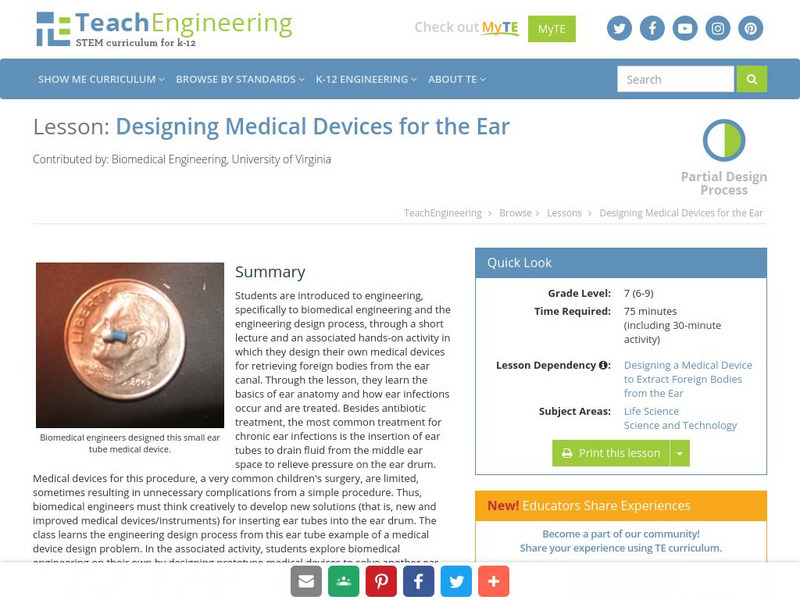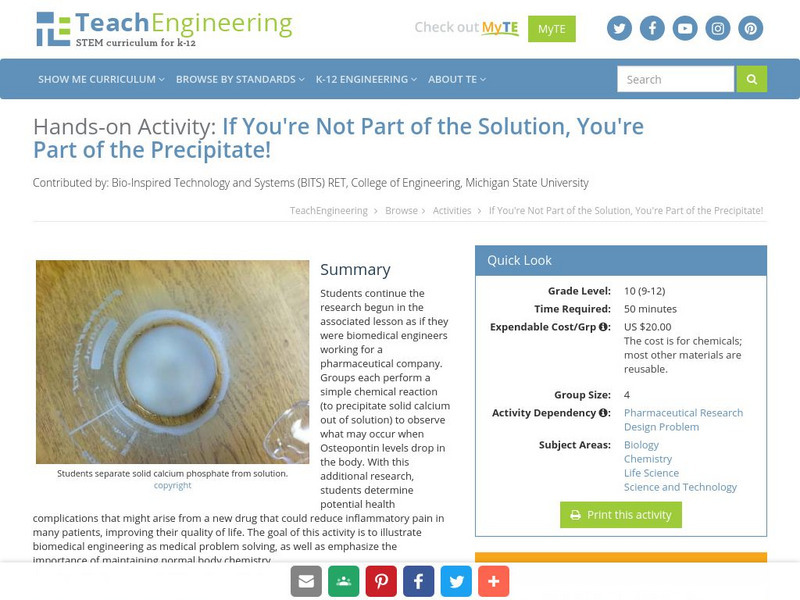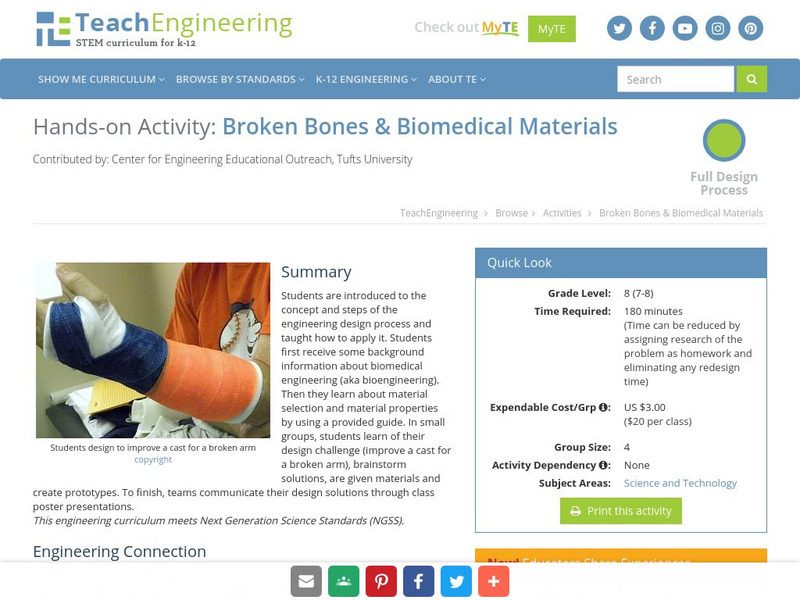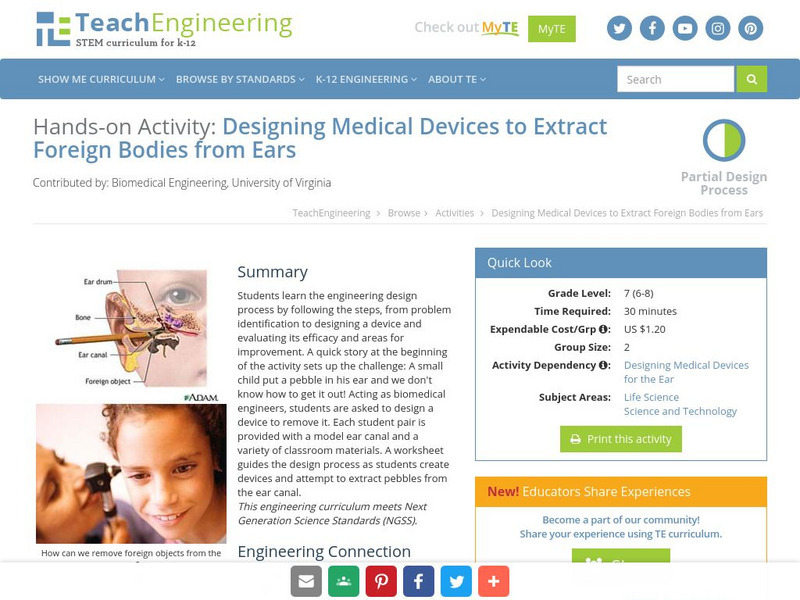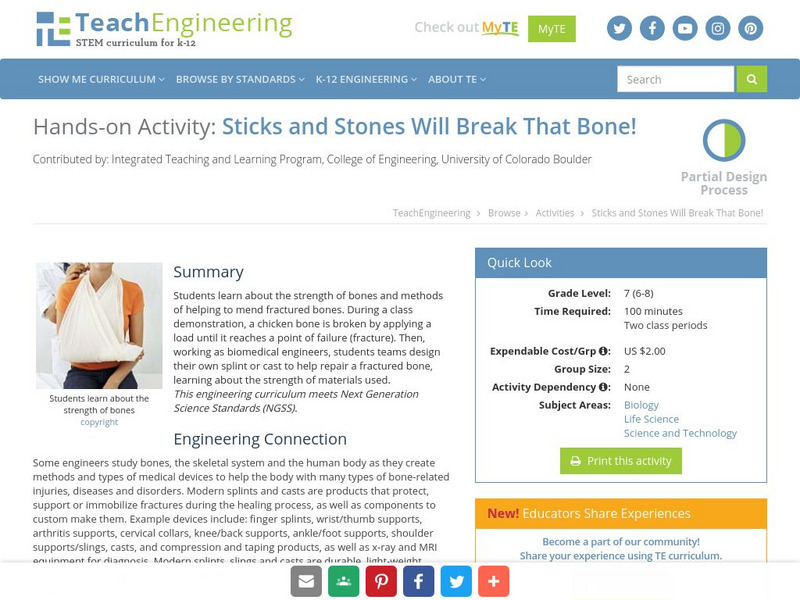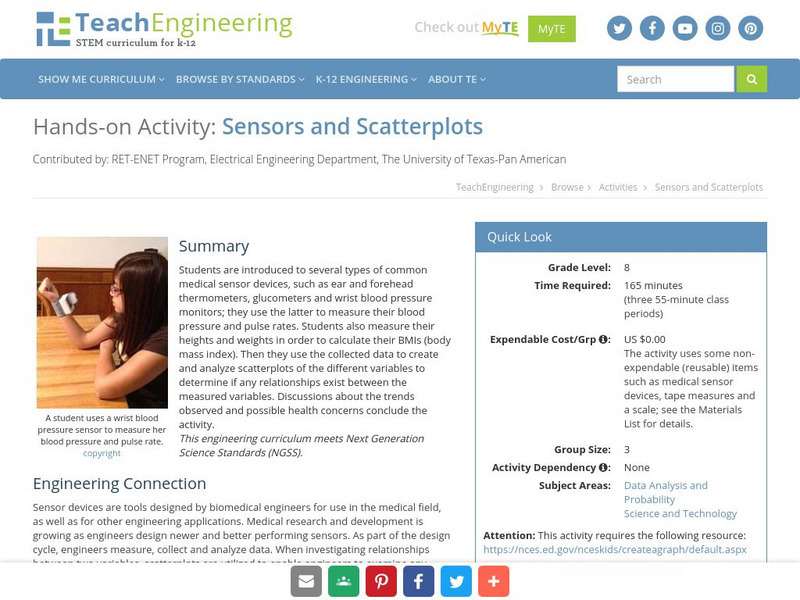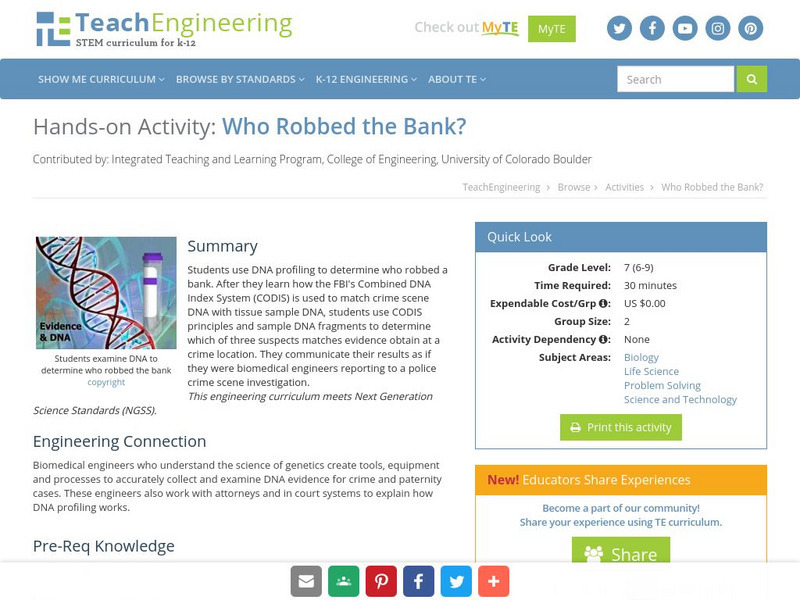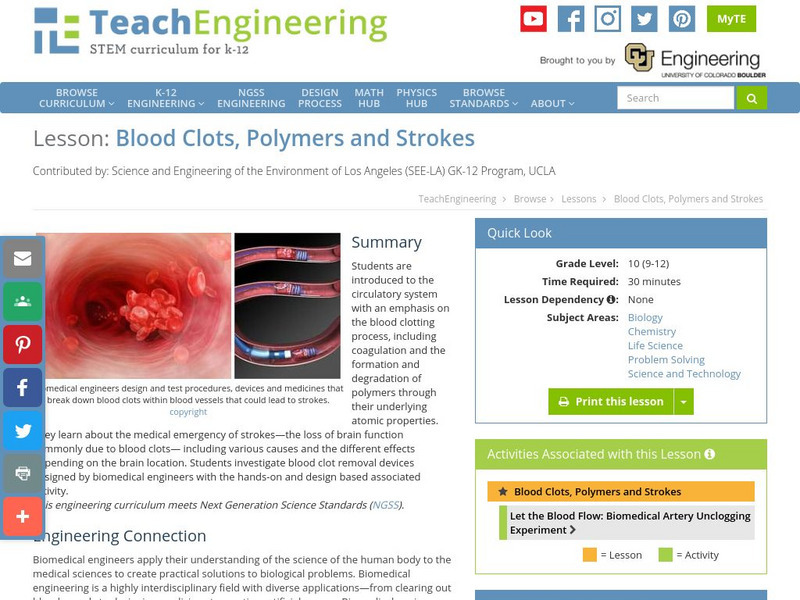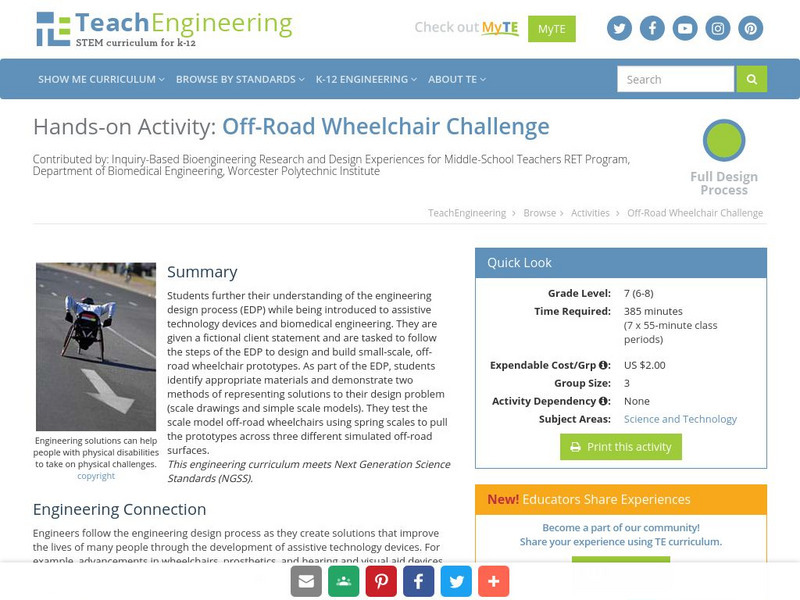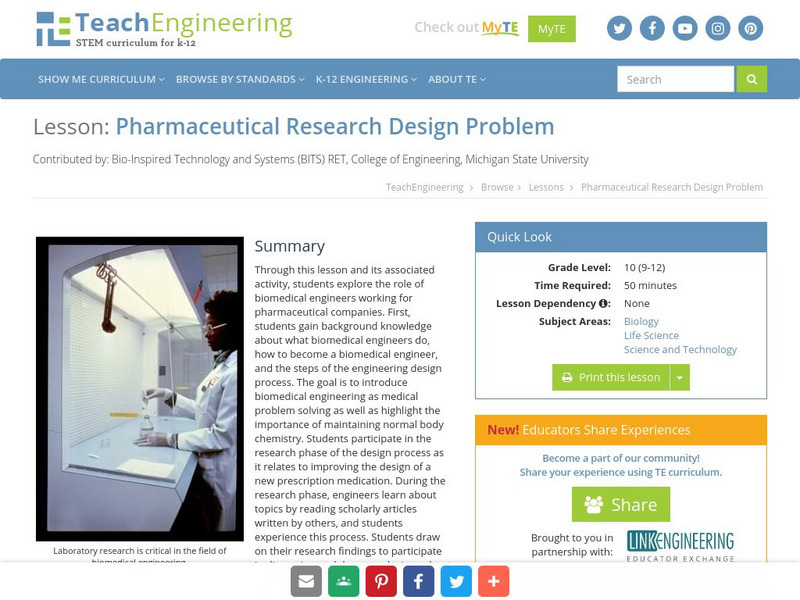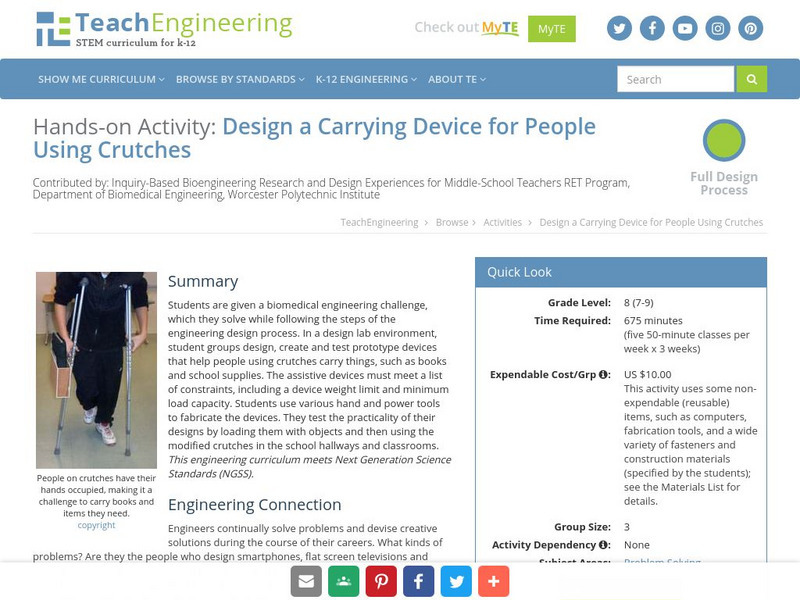Curated OER
Micro-controller Principles
Learners research micro-controllers and complete this 20 question worksheet on micro-controller circuits using schematics. This worksheet is printable and the answers are revealed online.
Curated OER
Design a Paraplegic Equestrian Saddle
Studnets develop a new equestrian saddle for a paraplegic rider.
Curated OER
Look at It from the Right Angle
Students investigate how geometry can be used in the field of fitness and physical performance. They view a video that demonstrates how doctors and therapists mention geometry as they treat sports-related injuries.
Curated OER
Super Scientists Bingo
In this science worksheet, middle schoolers select twenty-five scientists from the list to fill in their bingo card. Then they match each of the scientists listed to their correct description strip.
Curated OER
Super Scientists Code
In this science activity, students use the key code on the right to unscramble each of the scientists. They also match each of the scientists found to their correct description.
Curated OER
TE Activity: Space Shelter
Students simulate that they need to develop a new home on a different planet. They design a shelter that will ensure their survival after researching the characteristics of the other planet. They write an essay about their home design.
Curated OER
The Benefits of Biodiversity
Pupils examine the concept of biodiversity. They toss coins to determine what traits mouse parents have and the babies traits as well. They predict what would happen to the baby mice if the traits of the parents were different.
Curated OER
Genetics: Mice Rule! (Or Not)
Learners explore genetics and evolution by examining a hypothetical mouse population. Using coin tosses, they determine mouse traits of parents and offspring. Finally, they consider the outcomes of changing environmental conditions on...
Curated OER
Science: Comparing Beer and Bread
Students compare and contrast cellular respiration in yeast and plant and animal cells. After discovering the role of yeast in making beer and bread, they describe the short and long term effects of alcohol on the nervous and digestive...
TeachEngineering
Teach Engineering: Biomedical Engineering and the Human Body
Human beings are fascinating and complex living organisms-a symphony of different functional systems working in concert. Through a 10-lesson series with hands-on activities students are introduced to seven systems of the human...
TeachEngineering
Teach Engineering: Designing Medical Devices for the Ear
Students are introduced to biomedical engineering and the engineering design process through a short lecture and an activity in which they design their own medical devices for retrieving foreign bodies from the ear canal. They learn...
TeachEngineering
Teach Engineering: If You're Not Part of the Solution!
Students continue the research begun in the associated lesson as if they were biomedical engineers working for a pharmaceutical company. Groups each perform a simple chemical reaction (to precipitate solid calcium out of solution) to...
TeachEngineering
Teach Engineering: Broken Bones
The purpose of this activity is to introduce students to the concept of the engineering design process and to teach them how to apply it. In "Broken Bones," students will explore the steps of the engineering design process. They will...
TeachEngineering
Teach Engineering: Designing a Medical Device
Students learn the engineering design process by following the steps, from problem identification to designing a device and evaluating its efficacy and areas for improvement. A quick story at the beginning of the activity sets up the...
TeachEngineering
Teach Engineering: Sticks and Stones Will Break That Bone!
Students learn about the strength of bones and methods of helping to mend fractured bones. During a class demonstration, a chicken bone is broken by applying a load until it reaches a point of failure (fracture). Then, working as...
TeachEngineering
Teach Engineering: Digestion Simulation
To reinforce students' understanding of the human digestion process, the functions of several stomach and small intestine fluids are analyzed, and the concept of simulation is introduced through a short, introductory demonstration of how...
TeachEngineering
Teach Engineering: Sensors and Scatterplots
Students explore the use of several biomedical engineering sensor devices, and then use the collected data to create and analyze scatterplots of the different variables to determine if any relationships exist between the measured...
TeachEngineering
Teach Engineering: Who Robbed the Bank?
Students use DNA profiling to determine who robbed a bank. After they learn how the FBI's Combined DNA Index System (CODIS) is used to match crime scene DNA with tissue sample DNA, students use CODIS principles and sample DNA fragments...
TeachEngineering
Teach Engineering: Blood Clots, Polymers and Strokes
Students are introduced to the circulatory system with an emphasis on the blood clotting process, including coagulation and the formation and degradation of polymers through their underlying atomic properties. They learn about the...
TeachEngineering
Teach Engineering: Skeletal System Overview
Students will learn about bone structure, bone development and growth, and bone functions. Later, students will apply this understanding to answer the Challenge Question presented in the "Fix the Hip" lesson and use the acquired learning...
TeachEngineering
Teach Engineering: Off Road Wheelchair Challenge
Students further their understanding of the engineering design process (EDP) while being introduced to assistive technology devices and biomedical engineering. They are given a fictional client statement and are tasked to follow the...
TeachEngineering
Teach Engineering: Pharmaceutical Research Design Problem
Through this lesson plan and its associated activity, students explore the role of biomedical engineers working for pharmaceutical companies. First, students gain background knowledge about what biomedical engineers do, how to become a...
TeachEngineering
Teach Engineering: Teaching the Engineering Design Process
Students follow the steps of the engineering design process (EDP) while learning about assistive devices and biomedical engineering. They first go through a design-build-test activity to learn the steps of the cyclical engineering design...
TeachEngineering
Teach Engineering: Design a Carrying Device for People Using Crutches
Students are given a biomedical engineering challenge, which they solve while following the steps of the engineering design process. In a design lab environment, student groups design, create, and test prototype devices that help people...










